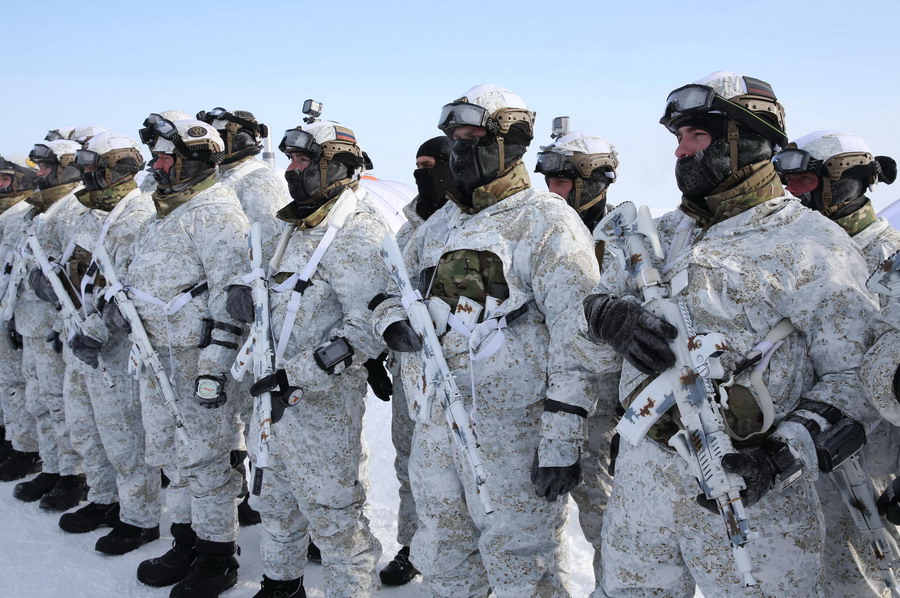 Photo Courtesy of Russian National Guard
Photo Courtesy of Russian National Guard
The Russian National Guard’s Growing Mission
In April 2016, Putin created the Russian National Guard, an independent military force that answers directly to him. ASP analyzed the strategic implications of this new force, which seems to be positioned to act as Putin’s personal enforcer. Commanded by Viktor Zolotov—Putin’s bodyguard and judo partner in the 1990s—the National Guard is ostensibly a counterterrorism and counter-revolution organization. But recent developments suggest that the group’s mission is expanding.
The Arctic
Representatives stated early this year that the National Guard was taking control of security for several strategic Arctic locations. The deployment of Russian National Guard troops to the region shows how the Kremlin envisions the force as instrumental to Arctic strategy. The Guard’s mission in the Arctic is to protect ships travelling along the Northern Sea Front. A specific site of interest is Pevek, an eastern Arctic town where Russia plans to develop the Akademic Lomonosov floating nuclear plant.
The mission in Pevek fits with what is now evident as one of the National Guard’s main roles: providing security to key infrastructure assets in the Artic. In 2018, it was tasked with guarding the port of Sabetta, which has been called one of the most important infrastructure projects in the Russian North. The Guard’s presence in both Pevek and Sabetta is only one part of Russian attempts to protect their powerful position in the Arctic; a new nuclear icebreaker is also set to be constructed and deployed soon. The National Guard’s security presence will be critical for achieving the Kremlin’s goal of shipping 80 million tons annually via the Northern Sea Route by 2024.
Cyber
The National Guard’s role in the cyber realm may be expanding as well. According to Russian law enforcement sources, the group has evolved to include a special unit focusing on cyber security and cyber intelligence. While their task is described as using cyber methods to “identify cases of extremism,” the reality may be different. In light of Putin’s recent efforts to restrict Russian internet activity, he may alter the National Guard’s mandate, using them to enforce a cyber-enabled domestic crackdown on dissent.
Coordination with Other Branches
In April of last year, the Russian National Guard began coordination with other branches of the Russian military via training exercises in the Far North.
An official press release described joint operations that included the FSB Border Guard Service and armed services controlled by the Ministry of Defense. The training task focused on finding and eliminating a bandit group, involving air searches and a special parachute system dubbed “Stayer.”
While the exercise achieved the goal of testing equipment designed for the unique Arctic climate, the most important aspect of the operation was coordination. As the first exercise conducted jointly with the FSB and Armed Forces, it allowed the National Guard to work out communication issues and synchronize multiple systems of command and control.
Scandal
Alexei Navalny, Russia’s most outspoken opposition figure and founder of the Anti-Corruption Foundation, has alleged than more than $29 million was stolen from National Guard food supply contracts. He posted a series of videos exposing what he saw as widespread corruption among National Guard leadership. The videos showed expensive properties that Navalny claimed Zolotov purchased with money meant for National Guard troops’ meals.
The National Guard’s response was swift and aggressive. In a YouTube video, Zolotov denigrated Navalny for his deleterious effect on Russian society. He also challenged Navalny to a duel and filed a lawsuit against him for alleged libel. Western news outlets covered the bizarre exchange, but days after the expose was published, Navalny was sentenced to 30 days in jail due to an unauthorized protest that took place in Moscow seven months previously.
The matter has recently become embroiled in legal bureaucracy. In February, a Moscow court ordered Navalny to remove his videos, due to apparent lack of evidence proving corruption within the National Guard. Navalny’s organization is in the process of appealing the decision. But his ability to defend his case might be limited; just last week, he was arrested again.
The suppression of Navalny’s accusations shows how the National Guard is protected by the might of the Kremlin. The force’s immunity from criticism, together with its newly-expanded roles in the Arctic and cyber, suggest its growing strategic importance in Putin’s regime. Continued evolution of the National Guard’s mission beyond original expectations is probable as Putin solidifies its capabilities and domestic strength. The Guard’s growth in power will likely offer Putin an effective instrument in carrying out bold policies at home and abroad.





